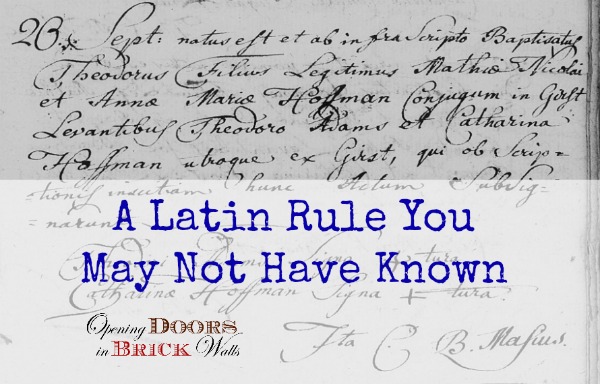My 52 Ancestors in 52 Weeks posts this year center around families in Luxembourg and Germany. Unlike my U.S. research, there are very few Facebook groups I feel I can share my posts with. Rob Deltgen, president of my genealogy society Luxracines, has a Facebook group for his genealogy website Deltgen.com and this is where I’ve been sharing my weekly posts.
I’m seeing more visits to my blog from people in Luxembourg. A couple of these have even commented in the group on my posts. Linda wrote this comment yesterday on my link to 52 Ancestors: #11 The Wollscheid-Barthelmes Family of Kirsch, Germany:
Hi, Cathy. I follow your research now every week and enjoy them a lot. I noticed you sometimes use the first names as they are used in the parish books such as Joannis, Caspari, Jacobi but these are the genitive forms of the names. In Latin, first names decline according to their role in the sentence. So the names in the example would be Joannes, Casparus, and Jacobus.
I had to read this twice before I replied. I may have been one of the best in my class while in school but sometimes I feel really dumb.
Well, Linda, as you can tell I’ve never learned Latin and this is new to me. I wondered why it was not always the same but didn’t think it had something to do with the grammar. Thank you so much for pointing this out to me. Now I may have a lot of correcting to do.
After sleeping on it, I checked online to see what Linda meant by genitive and decline in relation to the Latin language. As genealogists, we are always learning new things. I’m fluent in four languages but write only in English. For the generation I am presently working on, the records are mostly from church registers in Latin or indexed from the same. I thought I could get by without studying Latin. But, as I learned from Linda, it’s important to know at least some of the elementary rules of this dead language.

This is not a lesson in Latin
Linda’s well-intended comment showed me an error I’ve been making and, perhaps, you have too.
In grammar, genitive (abbreviated gen; also called the possessive case or second case) is the grammatical case that marks a noun as modifying another noun. ~ Wikipedia
Genitive refers to possession and decline or declension are the set of endings of words depending on their use in a sentence.
When I wrote the above sentence in my post yesterday, I included “Jacobus” and “Jacobi” in quotes as these were variations of his name I was seeing in indexed records. If I’d have paid a bit more attention I might have seen a pattern and realized my mistake.
Jacobus was the name seen on his death/burial record:

While Jacobi was found in records in which Jacob was seen as the father.

In the above example, Maria Anna was the daughter of Jacob Wolschett and Catharina Barthelmes. Maria Anna filia Jacobi et Catharinae. Or in the example of Jacob’s death, Jacob’s wife Catharina is seen as Catharinae (possessive). Wikibooks has a Latin lesson I plan to use for further reference.
Of course, I asked Linda’s permission to use her comment and after thanking her she sent this very enlightening comment:
It is sometimes quite useful when you read the parish books to be aware of the genitive, because in Latin all the words are just one after the other. In some cases you will have for example … baptisatus est Joannes Adamus Jacobi MULLER … Now you know that the child’s name is Joannes Adamus, and the father’s name Jacobus (and not child Joannes and father Adamus Jacobus).
If you are seeing several spellings of a name in Latin records or indexed information from Latin records, the difference is likely due to the rules which show who is being named: the child, parent, or spouse.
If you plan on checking out my last post, I’ve already fixed the error. From now on I will know the difference. I’ll also be making corrections in older posts, all thanks to Linda’s informative comments.
© 2017, copyright Cathy Meder-Dempsey. All rights reserved.






Very useful post, thank you! I haven’t dealt much with records in Latin but remember seeing name variations on some of the old German records – will keep that in mind when I get stuck in that line!
LikeLiked by 1 person
FamilySearch has a lot of old German births, marriages, and deaths indexed but the microfilms are not available online and in some cases not even for loan. I wondered if the variations were indexing errors. Now I know the difference. Thank you, Lana.
LikeLike
Catholic records are all in Latin. Be aware, too, that Joannes is often abbreviated as “Joa” which can look like “Ivo” or who knows what else, depending on the person’s handwriting.
LikeLiked by 1 person
Thank you, Linda. I found on an Irish site that J(s) were mostly written as I(s). I’ve also seen Joannes abbreviated as Jois and Joes. I’m taking a new look at them now.
LikeLike
Oh wow, Thank you for this post. I, too, have seen these differences in the Latin records I’ve dealt with. There’s always something more to learn!
LikeLiked by 1 person
You’re welcome. We never stop learning.
LikeLike
Wow, who’d have thought. I never took Latin and am struggling to figure out German. I hope this makes your research easier, not harder!
LikeLiked by 1 person
I think it will make it a bit easier. I won’t have to keep trying to figure out how a person’s name was supposed to be spelled.
LikeLiked by 1 person
LOL! Good point. Or wonder if it’s the same person.
LikeLiked by 1 person
This is fantastic, I never knew that! But I never had Latin in school either. I will remember for sure once I come to Latin records.
LikeLiked by 1 person
There are more things I still need to learn about Latin in church records. This really helped me to understand why I’ve been so confused with the different spellings.
LikeLiked by 1 person
Thank you for the very useful mini lesson. Now I understand why the name differences in old Latin church records. Add to that being American and only partially bi-lingual (I only took German for 7 years in school but that was over 30 years ago) and trying to keep up with Luxembourg records that are sometimes in French and sometimes in German! It is a good work-out for my brain! Keep up the good work on your blog.
LikeLiked by 1 person
I think Luxembourg is a great country to have ancestors from. The records are the same as other European countries but you get the diversity of the languages which helps with researching in all the other countries.You’re welcome and thank you for stopping by, Kathy.
LikeLike
This is super interesting. Quite a few of my family members were Catholic and the more recent records are in Latin. I haven’t paid much attention to the spellings as none of those family members in the recent records are direct line ancestors. In fact, I mostly just disregarded the spelling differences but now I will have to look at them with fresh eyes.
LikeLiked by 1 person
Thank you, Amberly.
LikeLiked by 1 person
Thanks for this Cathy. Latin was used in most of the church records (Catholic) in my Irish research. I have to admit, whenever I find any version of Jacob for my Irish ancestors, I automatically think James 🙂
LikeLiked by 1 person
Glad I could help, Dara.
LikeLike